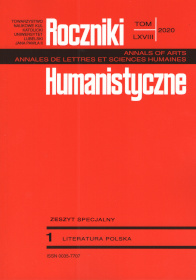Teatr słowa. Wokół koncepcji Juliusza Osterwy oraz Mieczysława Kotlarczyka i Karola Wojtyły
The Theatre of the Word. The Concepts of Juliusz Osterwa, Mieczysław Kotlarczyk, and Karol Wojtyła
Author(s): Anna SobieckaSubject(s): Theatre, Dance, Performing Arts, Language and Literature Studies, Fine Arts / Performing Arts, Studies of Literature, Polish Literature
Published by: Towarzystwo Naukowe KUL & Katolicki Uniwersytet Lubelski Jana Pawła II
Keywords: Karol Wojtyła; Mieczysław Kotlarczyk; Juliusz Osterwa; “theatre of the word”; theology of theatre
Summary/Abstract: The purpose of this article is to present two different theories about the “theatre of the word,” the first of these theories held by Juliusz Osterwa, and the second one held by Mieczysław Kotlarczyk and Karol Wojtyła. The idea that these theories belong to the literary phenomenon termed “proto-elements of theatre” is shared by all three of these conceptual authors. This phenomenon seems to be especially interesting because, according to Jan Ciechowicz, it constitutes the basis of Karol Wojtyła’s “theatrical world-view,” and, according to Janusz Pasierb, it also forms the “methodological roots” of Wojtyła’s poetry and drama. The analyses of the phenomenon presented in this article cover the canonical texts of both authors: the letters and private writings of Osterwa, gathered in the tome Przez teatr – poza teatr (2004), as well as Wojtyła’s correspondence, journalistic writings concerning the theatre and his works dealing with the theory of theatre, published in Poezje i dramaty (2001), and recalled in the recent Dzieła literackie i teatralne (2019). The spoken word, understood as a “proto-element of theatre,” and, at the same time, as a working, living force, is – in my understanding – a basic tenet of Karol Wojtyła’s thinking about theatre.
Journal: Roczniki Humanistyczne
- Issue Year: 68/2020
- Issue No: 1S
- Page Range: 203-214
- Page Count: 12
- Language: Polish

